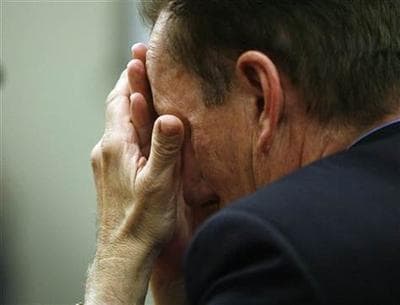Advertisement
Hospital Chief On Apology To James Woods For Brother's ER Death
http://www.youtube.com/watch?v=g57uTHWYC_Q
The news is nearly two years old, that Kent Hospital in Warwick, R.I. settled a suit by actor James Woods over his 49-year-old brother's Emergency Room death.
But it is still quite something to hear the hospital chief involved, Sandra Coletta, say out loud before an audience of hundreds that she apologized for what happened and that "Quite honestly, I did nothing other than what my mother taught me."
The issue of medical apologies is particularly relevant right now in Massachusetts, where the next wave of health reform is expected to include legal changes to help spur more of them.
Coletta spoke in Boston last night at the 10th annual dinner of MITSS, Medically Induced Trama Support Services, a widely respected group that aims to support patients, families, and staffs after things go medically wrong.
[module align="right" width="half" type="pull-quote"]'I can't tell you how to say you're sorry. I can just tell you to do what feels right in your heart.'[/module]
Things went very wrong with James Woods' brother, Michael, at Kent Hospital. According to news reports, Michael died of a heart attack while waiting in the emergency room, having come in for vomiting and a sore throat. The Associated Press reported in 2009:
The hospital's chief executive, Sandra Coletta, acknowledged at a news conference with Woods outside court that mistakes were made. She said the hospital is creating an institute in Michael Woods' honor and investing $1.25 million over the next five years to study redesigning health care and reducing errors.

Coletta provided an update on the hospital's changes last night, but she also offered a window into the emotional side of the incident. She was new to her Kent Hospital CEO job when she heard of the Woods suit, she said. When she listened in on the trial, she "found out that we hadn't done everything correctly. We had had a system failure. We had not followed a physician's order." But how could the hospital settle the case, without even defending itself?
"I remember saying to someone, 'The only way I could ever settle this case is if Jimmy would stand with me and agree to change this hospital for the better. If we could combine our efforts and take the pain that he and his family had endured, and join it with us to improve the care of patients going forward. Then we could settle.'
So we asked if he would meet with us. And I met with him. And that's really where all the headlines come: 'She said she was sorry!' Quite honestly I did nothing other than what my mother taught me. I think all too often in health care we evaluate, and we are counseled, and we read books upon books. But sometimes you just have to go back to your core value.
I faced a man who had lost his brother, a brother he had raised in the absence of a father. A brother who cared for an elderly mother while he was out doing his career. Someone who was very dear and close to his heart. When I met that man, I did not meet 'James Woods.' I met a family member who had lost a brother, because an order that was written by our emergency physician was not carried out by the staff.
[module align="right" width="half" type="pull-quote"]'Either you are a better actress than I am an actor, or I’m going to be coming after you.’[/module]
We did settle the case and we established the Michael J. Woods Institute, and the purpose of the institute is to redesign health care from a human factors perspective...
What happened in our emergency department was: the combination of the process and the human fallibility and the design of the space all conspired to create that failure. And that's the perspective that we all agreed to do. So I can't tell you how to say you're sorry. I can just tell you to do what feels right in your heart, because that's what that moment was about...
When Jim and I started to talk, he very nicely looked at me and said, 'Either you are a better actress than I am an actor, or I'm going to be coming after you.' Because the words 'I'm sorry and can we put this behind us and work forward' are meaningless if you do nothing with it. They're not words to be stated lightly, they are words that are meant to create change. So I was fortunate because I'm not as good an actress as he is an actor, which meant that I meant what I was saying, and we have made dramatic change in our emergency department, and hopefully in the future through the rest of our hospital."
This program aired on November 2, 2011. The audio for this program is not available.
